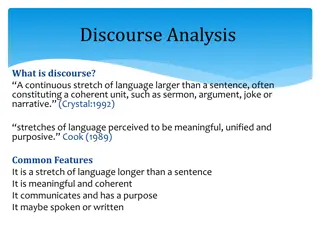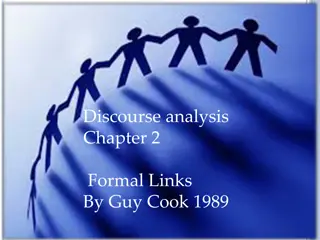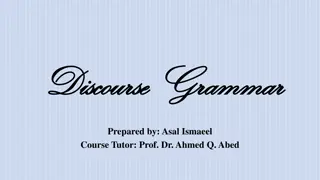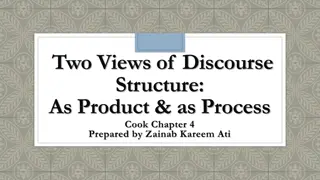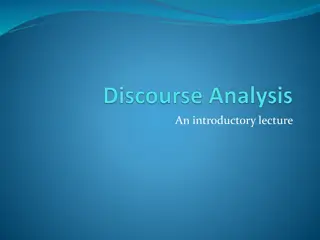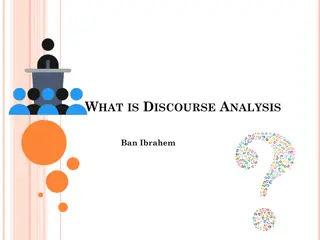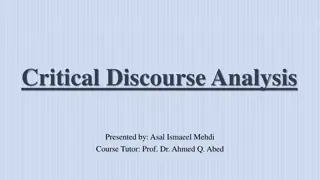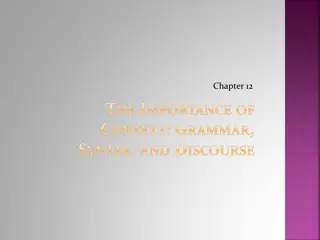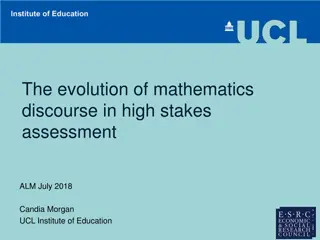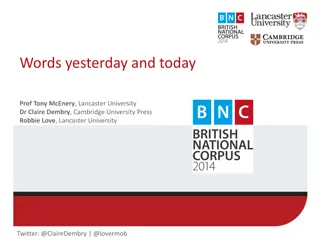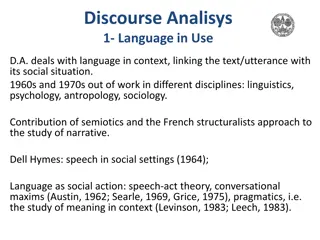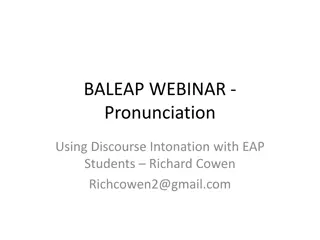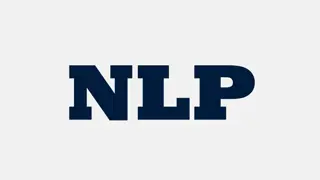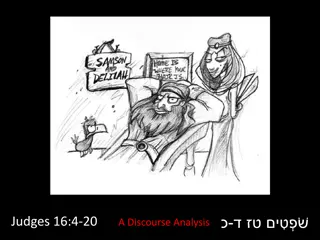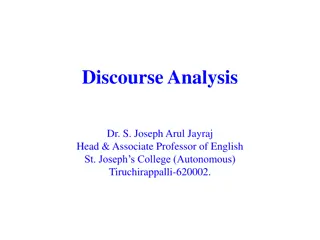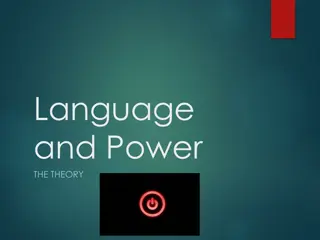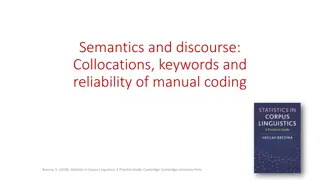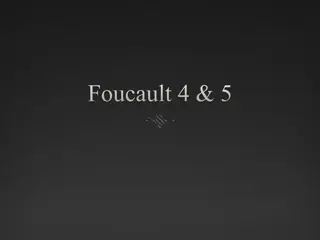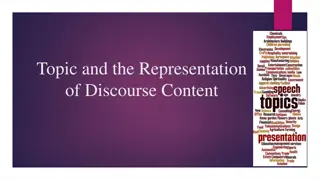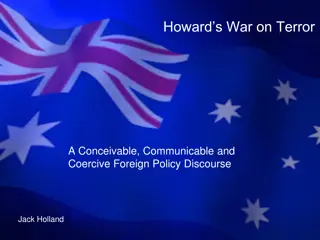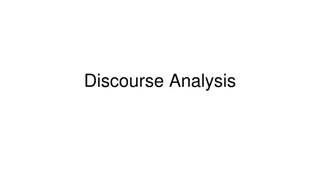Understanding Discourse Analysis: Exploring Language & Power
Delve into the world of discourse analysis to uncover the intricate connections between written language, social contexts, and power dynamics. Explore topics such as text and discourse analysis, critical discourse analysis, and the impact of unequal power relations on communication.
Uploaded on Sep 08, 2024 | 0 Views
Download Presentation

Please find below an Image/Link to download the presentation.
The content on the website is provided AS IS for your information and personal use only. It may not be sold, licensed, or shared on other websites without obtaining consent from the author. Download presentation by click this link. If you encounter any issues during the download, it is possible that the publisher has removed the file from their server.
E N D
Presentation Transcript
Analyzingwritten language
Textand discourseanalysis The value ofhaving some explicit knowledge ofthe grammarofwritten language is that youcanuse this knowledge, notonlyto analyse the texts but as a critical resourcefor asking questionsaboutthem - (Halliday 1966) Methods oftext anddiscourse analysis help explainlanguage in its context ofuse
Discourse Totality ofinteraction between humanswithin a given sphere orcontext (e.g. political discourse: speeches, editorials in newspapers, booksabout politics, commentsby politicians in public arenas)
Discourse analysis Analyzes notjust the text, but also relevant backgroundfromthe wider discourse, suchas what othertexts have had to say, what the relationships amongparticipants, etc.
Discourse analysis Methods focuson text, although theyare in no wayconfinedto it, and include ways ofanalyzing how text is organizedbeyond the level ofthe sentence as well as at the level ofthe sentence andbelow
Topics of interest Genres of discourse (various types of discourse in politics, the media, education, science, business, etc.) The relations between discourse and the emergence ofsyntacticstructure The relations between text (discourse) and context The relations between discourse and power The relations between discourse and interaction The relations between discourse and cognition
Critical discourse analysis (CDA) The analysis oftexts in their social context
Research questions inCDA Why wasthis text constructedat all? To whomis it addressed, andwhy? Doesthe writer ofspeakerhave hidden purposes, andwhat are they? What hidden assumptions andbiases underliethe text?
Topics Unequalpowerrelations determined bygender, ethnicity, nationality, age, wealth, education andculture Notonlydoesdiscourse reflect andillustrate these inequalities: it creates them
CDA inlaw The law ofthe land is created andimplemented linguistically incourtroom dialogue, written statutes andother texts The legality orillegality ofe.g. slavery is determined throughsuchtextual processes The phenomenofracismis inseparable fromits textual manifestations
Ideology CD analysts believe that ideology underpins most discourse andthat in orderto critically deconstructa text, it is necessaryto make the ideology explicit E.g. racist utterances are oftenprefacedby a denial ofbigotry( I mnota racist but ) andsometimes this denial andthe expression ofprejudicecan take a muchmore subtle form
CDA Examinesanyfeaturesofthe text that will shedlight on its meaning, especially on those aspects that are hidden Lexical choices, presuppositions, implicatures, metaphors, cohesive ties, politeness pehnomena, grammaticaloptions, stance andappraisal
CDA fieldsof interest Racism andrelated formsofdiscrimination Economicglobalization Genderstudies Discourseofadvertising
CDA in legal contexts Discourse-basedinjustices sufferedduringthe trial by e.g. rapevictims, child abuse victims, aboriginalAustralians charged with crimes, etc.
Genre analysis Examines texts which are considered membersofa genreto describe their typical configurationinterms oftheir features, suchas layoutand organizationofconcepts, andtheir use ofvocabularyandgrammar(their lexicogrammar) Texts take on certain characteristics which allow usto identify for whom theywere written andfor what purposes Another clueis the subjectmatter ofthe text
Exercise: identify thefollowing texts in terms of whereyouthink it wouldbe found, what its purpose is, whois writing for whom, what might havecome immediately beforeit and what might come immediately after Text 1: Preheat oven to 180 degrees. Greaseone 9x13 inch pan. Mix the flour, baking soda, baking powder, white sugar, brownsugar, cinnamon, cloves, nutmeg, andsalt in a large bowl until well blended. Beat the eggs, oil, andvanilla ina separate bowl until smooth. Foldinthe flour mixture, then stir in the pumpkin.
Text 2 Maryhasalsobeen involved this yearas a volunteer ESL teacher inour CommunityEnglish Language program. This program provides free English languageinstruction for membersofthe community, andclasses ate taught by ouruniversity students. Maryhasbroughtto the program anincredible amountofenthusiasm andinsight, andherstudents enjoyedhaving heras a teacher, andalso felt that they had learnedquite a bit ofEnglish. Mary senthusiasm, willingness to workhard, andability to communicate with people are all qualities which have been ofgreat nenefit to ourcampus.
Text 3 Last summer, I workedas a receptionist at the Northern Hospital Health Clinic. My position involved me ingreeting andhelping patients, scheduling appointments, andhandling insurancebulling underthe guidanceofthe officemanager. I hopeyoufindthat mybackgroundandskills wouldbe beneficial to your practice.
Text 4 Onceupona time, there was a little girl who lived on the edge ofthe forest.
Text5 Discussion Ellis andMellsop (1985) concludedthat de Clerambault s syndromeis an aetiologically heterogeneousdisorder. Theories ofaeiologyhave encompassedalcholism, abortion, post-amphetamine depression, epilepsy, headtrauma andneurologicaldisorders. None ofthese is relevant inthis case.
Genre A staged, goal-oriented, purposefulactivity in which speakers engage as membersofa culture While there is variation within a given genre, as genres are notfixed, they tend to follow a series of moves E.g. Academicarticles: Introduction methods results discussion - conclusion
Genre Letter ofrecommendation:Recommendation, willingness to provide further informationif needed Jobapplication:Declaration ofintention, willingness to provide more informationandattend aninterview, alongwith contact details Recipies: list ofingredients, step-by-step procedure
RecognizingGenre These staged moveshelp usrecognize genres andformthe basis for our ownwriting inrecurringsituations, allowing usto participate in communicative situations ina waywhich others will recognize as targeted towarda communicative purpose In addition, we canrecognizegenres by the lexicogrammatical choices text producersmake
Discourse community A groupofpeople with a set ofshared goalsandpurposesfor communicating, which leads to a type ofcommunicationwhich tends to be replicated insimilar ways Many studies within genre-based researchinclude descriptions ofthe context inwhich thegenres are embedded
Textual patterns Labov sanalysisofspokeninterview data: Narrativestructure: Abstract (Whatwasthis about? optionalelement) Orientation(time, persons, place, situation) Complication(a crisispoint, turningpoint) Evaluation(the teller s attitude; nota separate step, pervadesthe wholenarrative) Result(Whathappened? Resolutionto crisis) Coda(optionalwayoffinishingby returning listeners to present)
Textual patterns Problem/solution pattern: Situation Problem Response Evaluation/result
Sample analysis: situation, problem, response, result Soofteninmyteaching, I find students whose English is communicatively strong, andpossibly accuratetoo, until penhits paper. Manyare badly let downandheld backby their spelling. U decided to findouthow I couldhelp these learners imrove this skill. There is very little EFL material on the subject, soI also researchedspelling for native speakerchildren andadults. The results ofthat researchhave led to the following ideas on how to learn spelling, some waysto teachit andsome games to revise itl
Other patterns Problem solution (unable) Goal achievement (want to, wouldlike to, in orderto) Opportunity taking pattern (taking advantage of) Desire - fulfillment pattern (attractive, helpful) Gap in knowledge-filling pattern (in the absence of, given the lackof )
Decidewhich pattern bestdescribesthe texts below Ifyouwouldlike to have a nice vacation ina Branson cabinrental we have some ofthe nicest vacation rentals andcabins available anywhere
Lexical signaling Patterns intext are oftensignaled by the word choiceswe make



